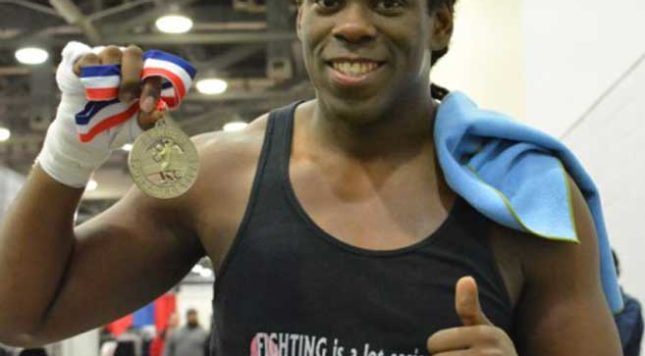“Counterpunch,” debuting today on NetFlix, is a well-shot, well-produced, well-framed boxing documentary telling oft-interesting stories that nonetheless arrives at very little in the way of surprises (and perhaps offers the occasional letdown) for the hardcore fan of professional pugilism. Your mileage may vary if you are a casual.
The premise is this: Why would anyone box nowadays? It’s a sensible question, and one that, with an indirect answer, explains the predicament modern boxing is in: A lot of people aren’t. The film chooses, as its subjects, a prospect, an amateur and a pro, stated as explicitly as that. “Counterpunch” centrally explores not only that question, but the related one of how the amateur scene is in such disarray and how that’s contributed to the pro boxing scene — centered, of course, on America, because in other countries the amateur boxing scene and in some cases the pro scene are prospering more than here.
A lot of the answer goes to, “Floyd Mayweather.” Two-thirds, in fact. The prospect, Chris “Lil B-Hop” Colbert — despite his nickname — wants to be Floyd Mayweather… flashy, rich. Peter Quillin, the pro, wants to be Floyd Mayweather. The only member of the triumvirate who doesn’t want to be Mayweather is Cam F. Awesome, who, as his name might suggest, is a bit of an oddball, because he wants nothing more than to win Olympic gold, at whatever age. (Overall, his personality — his interactions with random people on the streets, even — steals the show. His post-victory celebration, practically a human emoji, never got old for this writer, though his hipster-y quirkiness might rub some the wrong way.)
It must be noted here that Quillin, the middleweight contender, is not a fan favorite, and quite the opposite. Colbert, too, comes off as eminently unlikable — if not understandably so, given that he’s a punk teenager — at least at first. Among the many commendable aspects of the film is that everyone, eventually, is humanized. Villains become, if not heroes, at least not one-dimensional caricatures. Most of the figures in the film, from trainers to representatives of USA Boxing, deliver something like memorable quotes.
The error of the film might be, at least in part, the choice of subjects, other than Awesome. Quillin and Colbert have almost generic backgrounds. In a sport where destitute is more common than hardscrabble, the merely hardscrabble histories of Quillin and Colbert almost pale in comparison. Hell, at one point, Colbert demands cash from his hardscrabble (if not destitute) gym to buy some expensive sneakers for apparently no reason, and gets it.
One quality element of the film is portraying what boxing can do for someone, even if it never fulfills their dreams, which — spoiler alert — it decidedly does not do for the three central protagonists, at least by film’s end. That it costs less to run a boxing gym for a year than it does to jail a man for a year… that’s eye-popping. Colbert’s first opponent radiates the passion of a journeyman who just wants to feed his family, as opposed to buying the Bugatti Colbert dreams about.
Both Quillin and Colbert come in, during the film, for a little bit of “Is he the next Mayweather?” hype. Quillin never deserved it. For all his speed and attitude and Mayweather worship, nor, does that matter, for Colbert, at least based on the clips shown. (Another spoiler alert: Colbert has not fought much lately. Perhaps he has been stifled by Al Haymon, or perhaps he isn’t the prospect his pedigree would suggest, as the footage does.)
That “next Mayweather” business leads to one of the persistent flaws in “Counterpunch”: It is often too credulous. Repeatedly, figures make patently false or silly claims. Typically, documentarians either air those claims and demonstrate their falsehoods, or decline to air them. Yet we have Oscar De La Hoya saying it’s “unheard of” in his time for a boxer to drop his title belt to avoid facing someone, as Quillin did — as if De La Hoya hadn’t begun his pro career in 1992, when Riddick Bowe FAMOUSLY dropped his belt into a trash can in front of the media to avoid facing Lennox Lewis. And it’s far from the only “huh?” moment of the film, the kind of moment where simple fact-checking would have ameliorated.
See “Counterpunch,” by all means, Netflix subscribers. But if you’re a hardcore boxing fan, it will offer only mild pleasures and the occasional frustration. If you’re not a hardcore fan, it will do a solid job of explaining the state of modern boxing — just take some of it with a grain of salt.
(Photo: Cam F. Awesome, via)

